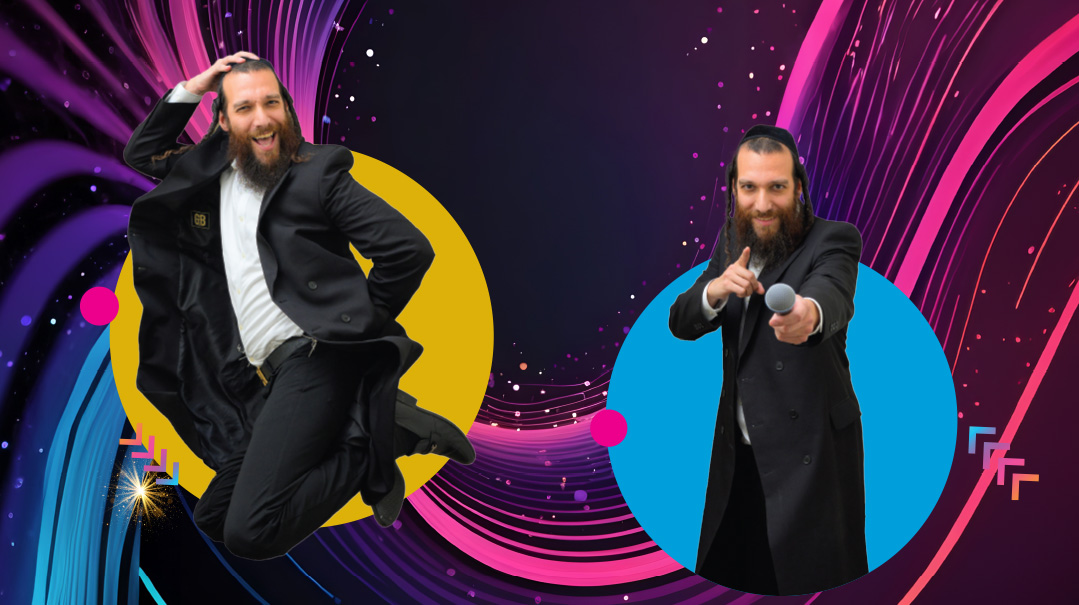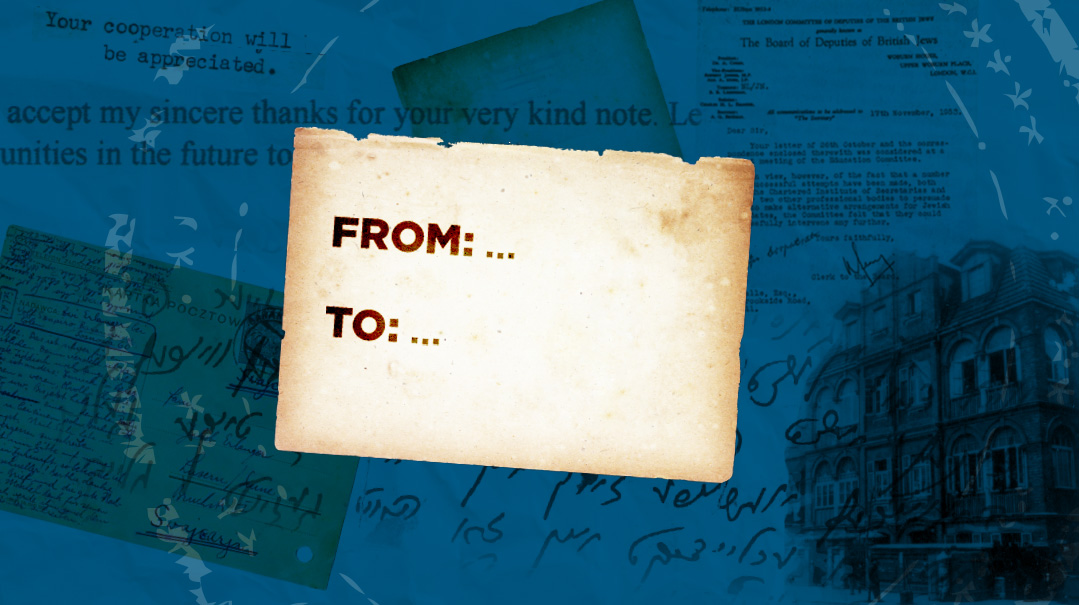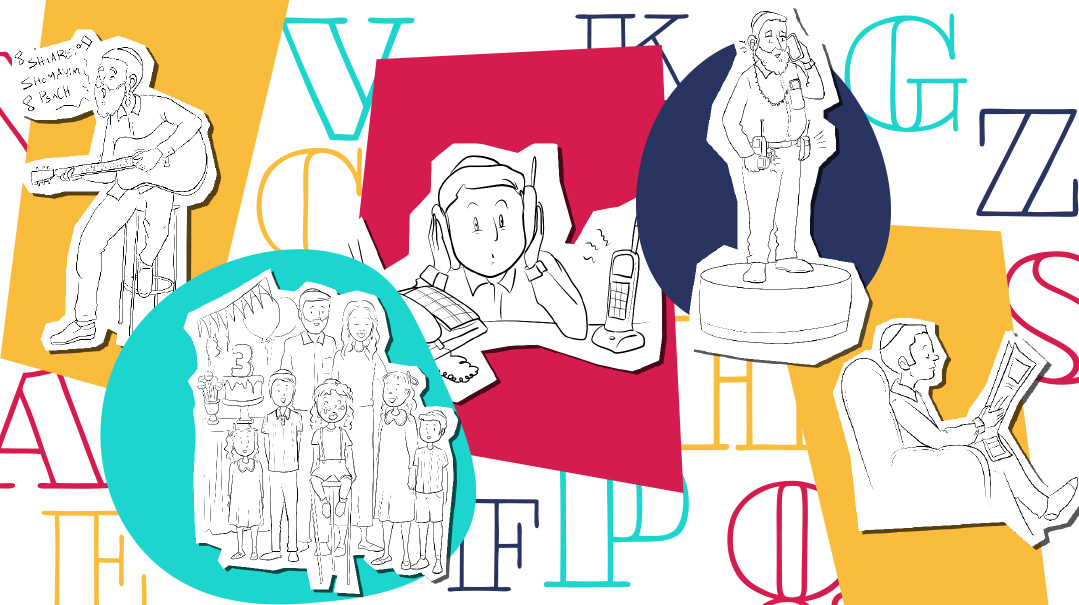Like Stars Forever

Onstage or in shiur, Beri Weber helps his bochurim shine

He’s busy working on his tenth album, and nights see him singing at upscale weddings around the world. But there’s another side to Beri Weber: The construction worker-turned-vocalist is also a rosh yeshivah, filling a void for bochurim who have nowhere else to go. Because for Beri, all those notes blend into one harmonious chorus
T
he quaint depiction of a small group of students gathered around a plain wooden table listening intently to their rebbi has been a staple of Pirchei stories for decades. It’s the world of the poor innkeeper facing off against the wicked poritz and jail guards who get bribed with a bottle of vodka. That world has long grown antiquated but, for a few hours each day, several batei medrash in Monsey, New York, seem to have been frozen in time. The students, the table, the rebbi; it could all easily pass for Mezhibuzh circa 1800.
But one obvious feature gives this scene away as patently 21st century. The rebbi. His face is well-known, and thousands are familiar with the melodious vocals that have catapulted him to the highest levels in the world of Jewish entertainment. His place is on the stage, shimmering in the spotlight’s brilliance, scaling past standing ovations as his hit songs reach their crescendo.
This is no rebbi after all.
Or is it?
Those who know the real Beri Weber are confident the day will come when Pirchei leaders will regale their charges with the tale of a superstar singer who cared, taught, cried, and humbled himself, as any rebbi would.
The poritz and the innkeeper are long gone, but in Beri Weber, a glimmer of the old-time rebbi lives on.
The Morning Stars
It’s a gray, rainy day as I trudge down a muddy Monsey sidewalk in search of the address where I am to meet with music icon Beri Weber. I’m told that it’s home to a beis medrash, but at first glance the edifice is undiscernible from any other home on the block. One telltale sign indicates otherwise — the front door is slightly ajar, inviting entry. I push the door open, walk up a few carpeted steps, and open another door.
A burst of song greets me, along with accompanying banging. “A gut morgen, morgen morgen morgen….”
I spot a smiling Beri Weber among the group of boisterous singers and tabletop drummers who form the chaburah called “Kochvei Boker.” The group, numbering ten in all, is seated around adjacent folding tables, and, while the personalities tend to be colorful, the dress code seems conventionally yeshivish, if with a chassidic overtone.
It seems the minhag among the crowd who attends Beri’s morning shiur is to greet each visitor with a thundering rendition of the catchy “Gut morgen” tune.
The singing dies down and I stand off to the side as Beri resumes speaking. “Az einem nemt a diamont uhn varft es in vasser arein….”
The shiur is given in Yiddish, and copies of a sefer based on the teachings of Rebbe Nachman of Breslov, “Hishtapchus Hanefesh,” lie open on the table; I seem to be catching the tail end of a mashal about a diamond being thrown into the sea. The group is listening closely, but the atmosphere is a relaxed one, where questions, comments, and jokes are welcome and even encouraged.
The beis medrash’s trappings are unadorned; a compact room with an aron kodesh made of plain, unstained wood. If not for the occasional “ding” announcing the arrival of a digitized notification, it would be easy to imagine we’d been transplanted to the shtetl three hundred years ago.
Then the door swings open and in marches a fellow who seems quite a bit older than the rest of the group.
Immediately there is another outburst — “A gut morgen, morgen morgen morgen” — along with the ritual banging.
“This is Shmuel from Mishpacha magazine.” Beri nods in my direction as he introduces me to this new addition.
“My name is Yossi Silberstein,” he says, taking me to the side, “but people call me Humble Yossel.” (For certain, there has been at least one innkeeper in the days of yore named “Humble Yossel.”) Humble Yossel then shares his thoughts and sentiments about the man he describes as “one of the finest people in Klal Yisrael.”
“People think that Beri is a singer,” he tells me, “but he isn’t. Beri is a light to the world. Singing is one of the channels through which this light shines.”
Yossel tells me he knows of numerous couples who have even turned to Beri for help with shalom bayis, and his counsel was always instrumental in affecting improvement.
“Every talmid is like his own child,” Yossel continues. “Beri spends hours with them on the phone, wherever they are in the world.” His obvious deep admiration for his rebbi, whom he nevertheless refers to with the casual “Beri,” says much about this rare rebbi/talmid dynamic.
Having shared his thoughts, Yossel returns to the shiur and I follow behind. Presently, the talmidim close the Breslov seforim and open volumes of Maseches Kiddushin to daf lamed vav. Beri begins teaching the concepts of smichah and tenufah. “Smichah” refers to the requirement to lean upon an animal being brought as a korban. “Tenufah” refers to the requirement to wave a part of the animal (following the slaughtering) in four directions.
There are various opinions as to the literal translation of the word “tenufah”; per Targum Onkelos, it means “elevate.”
Leaning and elevating. Simple concepts taught around a simple table.
Or perhaps it’s not so simple. Perhaps it’s not simple at all.
The shiur ends about eleven o’clock, and Beri has to leave for a brief break. Almost immediately, the talmidim introduce themselves, eager to share their perspectives and experiences.
One boy tells me how he was struggling with drug addiction and couldn’t get accepted into any yeshivah, “I was introduced to Beri and he accepted me without a farher.” This was a turning point in his life. “I call Beri about three times a day,” he says. “He’ll pick up the phone at 1:30 in the morning, even on vacation.”
One talmid shares a painful analogy. “You know how people buy properties in decline, fix them up, then sell them? That’s Beri. He takes broken properties and fixes them.” This boy describes how he had been expelled from yeshivah four years prior. “At one point I had nothing to do with Yiddishkeit. Then I came to Beri. I have no words to describe what he did for me. Whenever I needed chizuk he was there for me.”
As with any rebbe, the chassidim have their mofsim to share.
“I needed a shidduch,” one talmid shares. “Beri told me that I should say Shir Hashirim with intense kavanah on Shavuos. If I do that, he said, I’d become a chassan. I did it, and exactly 40 days later, I got engaged.”
Take My Sacrifice
“The one song that expresses my approach to chinuch, and a lot of what I do, is ‘Korban,’ ” Beri tells me.
Released in 2022, the song’s refrain — composed by Hershy Weinberger and sung by Beri — is based on the second pasuk in parshas Vayikra, “Adam ki yakriv mikem isheh laHashem — When a man from you brings a sacrifice to Hashem….”
“Adam, adam ki yakriv mikem
mikem korban, korban laHashem.”
The next segment of the song is a chorus of oy oy oy oys, expressing the depth of yearning that comes with each sacrifice we make for the sake of Hashem and how these sacrifices need not necessarily refer to animals in the times of the Beis Hamikdash.
“Ribbono shel Olam, yeder kleiner rir
Ribbono shel Olam, bin ich makriv fun mir
Mein korban shoin nem
Adam ki yakriv mikem”
The lyrics hint to a homiletic interpretation of the words, “adam ki yakriv mikem — when a man from you…” The sacrifice that the pasuk is referring to can be understood as the sacrifice of “you,” the giving up of one’s self. In English, the words translate as follows:
“Rbibono shel olam, with every move
Ribbono shel Olam, I sacrifice from myself.
Please accept my sacrifice
Adam ki yakriv mikem…”
“Feeling another Jew’s pain isn’t easy,” Beri explains. “It requires sacrifice. You have to give up of your own self-comfort to experience the discomfort of another.” Beri’s role as a singer makes this particularly challenging. “One night I can be performing at the most extravagant party, and everything is happy and wonderful. But the next morning I can be in a hospital, singing for children with terrible illnesses. How do I relate to their pain? How can I really feel a little bit of what they’re feeling? The answer is ‘korban’ — I need to sacrifice. ‘Adam ki yakriv mikem’ — you have to give up of yourself.”
Beri’s sacrifices don’t just take the form of scheduled hospital visits or performances in other chesed venues. Partnering in the suffering of others is a constant endeavor for him, but starting about nine years ago, he’s taken it to new heights.
“In 2015, I was asked to head a yeshivah for boys who were struggling to fit in with the system,” Beri tells me. “The yeshivah was named Kochvei Ohr — stars of light.
“From our position on Earth, the light that shines from the stars seems small and insignificant,” Beri says, explaining the meaning behind the name. “But as one moves closer to them, it becomes clear that the light is actually brilliant.”
The job would require Beri to teach, but even more, to listen and to feel. Many of these students had difficult pasts and, while they may have been cloaked in the latest in fashion and style on the outside, on the inside, they were searing. It was Beri who would lend them a shoulder, at first to lean upon, and later, to stand upon.
Smichah and tenufah.
For Beri, it’s not a simple sugya at all.
“Slight emergency,” Beri says when he returns from his break. Beri is about to release his tenth album, and, when giving it one final listen together with his family, his son pointed out an error.
“One of the songs has a line that references the Kabbalistic idea about the unification of chassan and kallah being metaphorical of the bond between Hashem and Klal Yisrael,” Beri explains.
“But my son pointed out that I accidentally say that Klal Yisrael is the chassan. In fact, Klal Yisrael is the kallah. I need to head to the studio to correct it.”
We rush off to the studio, where we meet Moshe Jacob, a young chassidishe fellow who can play the mixer’s webwork of buttons and dials like a fiddle. He and Beri exchange some rapid-fire Yiddish, then Beri takes the mic and in a matter of minutes, the problem is solved. The issue of accurately reflecting the relationship between Klal Yisrael and Hashem has been easily resolved, but I can’t help but notice the Providence.
Whether through his music or his teaching, Beri’s objective is to bring the kallah that much closer to the chassan.
Heart to Heart
Upon leaving the studio, we head off to Yeshivah Lev Torah, located on Monsey’s Viola Road, where Beri delivers an afternoon shiur. We arrive during lunchtime and find the boys preparing lunch themselves, manning the ovens and stovetops with an ease that’s incongruous with the rest of their lives. A rebbi named Reb Shia Wachs sidles up to Beri and asks him if he’ll be attending the siyum. I know which siyum they’re referring to — Beri had told me the story a few minutes earlier.
There was a student in Kochvei Ohr who had undergone a series of great challenges. Once under Beri’s charge, he dedicated himself to his studies and slowly, things began to change for the better.
“One day,” said Beri, “he told me that he kept Shabbos, the first in quite some time. I was so overcome, I reached into my pocket and pulled out three hundred dollars and handed it to him.” The boy looked at the money and began to cry. Beri looked on, confused, but the boy explained.
“I had told a friend that I planned to keep Shabbos, and he laughed me off. I asked him what it would take to get him to keep Shabbos with me, and he said, ‘three hundred dollars.’ I gave him the money and said, ‘Hashem will pay me back.’ And now you’re giving me exactly three hundred dollars.”
This boy went on to make dramatic improvements and is now making his first siyum.
Yeshivah Lev Torah was founded by renowned askan Reb Benjie Brecher and is run under the auspices of Rabbi Mechy Brandwein. The yeshivah is very much a paradigm of Beri’s take on stars; those standing from afar may miss the brilliant glow, but Beri, and the other dedicated staff, see it clearly.
After lunch, the boys gather around the table. There are no seforim or notebooks; the shiur is structured as a conversation with plenty of schmoozing. Every so often, a boy walks toward the pull-up bar in a nearby doorway and hoists himself up. Beri doesn’t seem to mind.
He continues with his shiur, shares a mashal and then a story about Rav Pinchas Koritzer. The lessons he communicates are straightforward, relevant, and relatable — just as he is.
When the shiur ends, the boys daven Minchah. I prepare to leave but Reb Benjie wants to speak.
“Most people know Beri Weber as a singer,” he says, “but I know him in a different sphere. When he came to Lev, I saw the real Beri. Because that’s what he is. A lev. He has a heart. And through his heart he opens the hearts of these boys.”
And gives them the freedom to shine.
How Can You Stop?
The morning chaburah, Kochvei Boker, and the afternoon shiur in Lev Torah actually share a common root.
Initially, Beri held the title of rosh yeshivah, standing at the helm of what was called Kochvei Ohr. It took some time for the fledgling yeshivah to find a location, until eventually they struck roots in a beis medrash built into the basement of Monsey philanthropist, Jack Klein, also spending time in the famed Scheiner’s shul, a credit to Reb Leizer Scheiner’s great hospitality. The work was tedious, painstaking, frustrating, but, with time, rewarding. The arrangement, however, couldn’t last.
Beri Weber himself was developing into a household name; the singing jobs were coming nightly and he was fast realizing that serving as a rosh yeshivah and a singer wouldn’t work much longer.
“I simply couldn’t keep it up,” says Beri. “It was taking all the energy out of me.”
Torn between passion and practicality, Beri turned to his rebbe, the great tzaddik and mekubal, Rav Yitzchak Meir Morgenstern. “I told my rebbe that I was no longer able to keep the yeshivah running,” says Beri, “and he told me, ‘Okay, you can close it, so long as you find someone who will take full responsibility for each boy.’ ”
Wanting to impress on Beri just how effective his tutelage was, Rav Morgenstern continued. “He named me three former talmidim who had visited him and informed him that they gave up their smartphones,” Beri recalls, “and he said, ‘How can you stop when you’ve had such hatzlachah?’ ”
Beri attempted a counteroffer. “I often get asked to teach classes in other yeshivos,” he said. “How about if I disband my yeshivah but continue teaching by giving occasional shiurim in different yeshivos?” Rav Morgenstern smiled. “That’s a wonderful idea,” he said. “Do both.”
With time, Beri arranged a new working method. He transferred the boys in his yeshivah to different yeshivos that he felt would be a good fit for them, and worked with those who had already graduated to help them get jobs and move forward in life. Ultimately, his Rebbe’s directive to still run his own program led to the opening of Kochvei Boker, his morning chaburah. Although it’s open to all, the chaburah was originally intended for graduates of Kochvei Ohr.
The term “Kochvei Boker — Morning Stars,” is meant to reflect that these students are on the rise, having overcome much of their life’s challenges. But, incredibly, there’s an additional level of meaning as well. The chaburah is the product of Rav Morgenstern’s vision. In Yiddish, the word “Morgenstern” means precisely that — “morning star.”
Beri’s shiur in Yeshivah Lev Torah fulfills the next part of Rav Morgenstern’s instruction, where he guest lectures for students who aren’t his own but whom he cares for just the same. Additionally, over the course of the week, Beri gives several other chaburahs in various yeshivos throughout Monsey.
Beri’s relationship with Rav Morgenstern, a renowned Breslov mashpia, dates back many years and plays a central role in Beri’s life, although it comes as a surprise given his upbringing.
Why Not Sing?
“I grew up in Williamsburg in a family of Pupa chassidim,” Beri shares. He was very much a typical kid; he sang nicely but, “By chassidim, we all sing,” he avers. Still, his vocals must have stood out somewhat because he was recorded on some of the albums produced by J.J. Fried. Academically, he says, he had little exposure to anything outside of the classic yeshivah curriculum along with basic chassidic teachings, although he did have one brother-in-law who was close with Rav Eliezer Schick z”l, a well-known mashpia in Breslov.
But in the strangest of ways, it was Heaven-orchestrated that Beri adopt a Breslov approach to life, and, ultimately, to music.
After finishing yeshivah in Pupa, Beri went to Eretz Yisrael to learn in the Mir, where he was introduced to Reb Chaim Daskal, a man who would host scores of guests for each Shabbos meal. At these meals, Reb Chaim (who passed away in 2014) would ask everyone to introduce themselves. “I was the only one wearing chassidishe levush,” Beri remembers, “and I knew that saying that I’m a Pupa chassid wouldn’t mean anything to anyone.” And so, drawing on his limited exposure to Breslov through his brother-in-law, Beri took a deep breath and announced, “My name is Beri Weber. I’m a Breslover chassid.” Reb Chaim Daskal himself held a deep appreciation toward Breslov and reacted with delight.
A few months passed and Rosh Hashanah was approaching. Beri had booked a ticket to return home for Yom Tov, and went to the Kosel to bid farewell before leaving. While there, he met Reb Chaim Daskal. Beri recounts the conversation that ensued.
“Reb Chaim came over to me and said, ‘Nu? When are you going to Uman?’ ” Beri stared at him, confused.
“Uman? I’m not going to Uman!” But Reb Chaim would not accept it.
“Not going to Uman?! Why not? The price? I’ll pay for it!”
“Uh,” Beri stammered, “I— I already told my father that I’m coming home.” Reb Chaim took it in stride.
“Go ahead, call your father. Ask him if you can go to Uman.” So Beri did, and to his surprise, his father gave him his blessings to join the throngs in Uman on Rosh Hashanah. “Actually,” Berry comments, “my father himself had been to Uman for Rosh Hashanah in 1992.”
Beri headed off for Uman, but while he says his tefillos were heartfelt and inspired, “I didn’t really feel anything special.” Still, he believes those tefillos must have been effective, because a few months later, on Chanukah, he returned home for the traditional beshow, and then he and his kallah announced their engagement.
After their wedding, the Webers struck their roots in Monroe, where Beri took a job working in construction. But after the 2008 crash brought the construction industry to a nearly complete cessation, Beri found himself looking for a new job.
“One day my wife said to me, ‘Beri, you like singing. Maybe you can join a choir and sing in studios.’ ” That jumpstarted Beri’s musical career, and things took off from there. Then, someone came along with another suggestion. “There’s a fellow named Naftali Schnitzler who wants to begin a career as a producer,” he said. “Perhaps you can collaborate with him and put out an album?”
Beri and Naftali hit it off, and shortly after, Beri’s new single called Elokim Batachti came out, along with what was then considered a cutting-edge music video. It was an enormous hit and, at this point, Beri joined Shira choir and decided to devote himself exclusively to music. Simultaneously, he worked alongside Naftali on a more comprehensive project that resulted in the release of Beri’s first album, B’ezras Hashem Yisborach, released in 2009. It didn’t take long before the offers started cascading in.
It was around this time that the Webers moved to Monsey, and when Rosh Hashanah came around, Beri had to find a shul in which he’d feel comfortable. “Then my wife said, ‘You once went to Uman — why not try it again?’ ”
Beri took the suggestion seriously and traveled to Uman for the second time, where he first met Rav Morgenstern. “I walked into a beis medrash and saw someone in the front, davening with a group of chassidim. Something about it captured me. I felt something I cannot explain,” he remembers.
“The next day, I went back to the beis medrash. He wasn’t there so I asked around, and they told me that he was in the middle of conducting his Rosh Hashanah seudah.” Beri followed the directions he received and was spellbound by what he saw. “There was a man standing on a table, singing an old Yiddish kindergarten song, and Rav Morgenstern sat at the head of the table laughing heartily.” It was a scene unlike anything Beri had ever witnessed — a tzaddik celebrating Rosh Hashanah with the heightened simchah encouraged by Breslov teachings.
After Yom Tov, Beri headed home, but as time would prove, the departure from Uman was unilateral — he left it but it didn’t leave him. The tzaddik had kindled a spark of inspiration in Beri that would only grow.
“By the time Chanukah came, it was like something exploded inside of me. I started learning for hours a day, my davening changed, my mehalech hachayim became infused with ruchniyus.” Beri began to feel an intense attraction toward Breslov. “I started learning the Torah of Rav Shalom Arush as well as other Breslov seforim,” he recalls. And the enlightened passion also had a profound impact on his music.
“My next album was Thank You Hashem,” says Beri, “a theme based on a lot of Rav Shalom Arush’s teachings.” And generally, while not all his songs directly expressed Breslov concepts, all of Beri’s music took on a new level of spiritual depth.
Beri began learning with multiple chavrusas, one of whom was a Chabad chassid. “My Chabad chavrusa was the one who recommended that I begin teaching,” he says. “At first I looked at him and said, ‘Me, teach?’ ”
But the chavrusa encouraged him to try and that’s what led Beri to his initial sessions with boys struggling in yeshivah, from which he’d later pivot to become the rosh yeshivah of Kochvei Ohr.
Sometime later, Beri began learning the seforim of the tzaddik who started it all, and found himself enraptured by the Torah of Rav Yitzchak Meir Morgenstern. Today, he maintains a close connection with him. Rav Morgenstern is his rebbe, the one who penetrated his soul and polished his star so it could shine bright enough for the world to enjoy.
Oif Simchahs!
While Beri’s music is available for all to listen to via digital mediums, his live performances take things to an all-new level. The energetic Beri effuses a passion and spirit that sweeps the crowd in and injects the environment with thriving vivacity. It isn’t surprising that he’s become a highly popular wedding singer. For the past year and a half, Beri has been working on a wedding album that presents his general style and encapsulates this vibrancy. It will be is his tenth album, a milestone he takes seriously.
“Ten is very significant,” says Beri, “And I wanted to do something significant to acknowledge the accomplishment.” Beri knew he wanted to put out a wedding album and toyed with a few ideas. Ultimately, the concept he decided on was to invite ten singers to join him on various segments of the album.
Since it’s a wedding album, he split it into seven tracks — a reflection of sheva brachos, divided as follows. There’s the kabbalas panim, followed by the chuppah. There’s a “freilich set,” which presents a warm, heimish style music. Then comes the second dance, followed by a rock set, a kumzitz, and, finally, a mitzvah tantz. Each of these tracks feature at least one other singer accompanying Beri.
“There is usually no singing at a kabbalas panim,” says Beri, “and so our kabbalas panim track has no vocals. It features the music of three common wedding songs: “Od Yishama,” Carlebach’s “Meheira,” and “Vayehi B’Yeshurun Melech.”
For the chuppah, Beri asked Motti Ilowitz to join him. “Motti sings with a lot of hartz,” Beri explains, “and he’s very creative. He composed new lyrics for five of my chuppah songs.”
For the freilich set, Beri enlisted his first cousin, the very talented Suscher Gutman, along with Shea Berko. “Shea has been in the music industry throughout my entire career,” Beri comments, “and he is very consistent in his music. I very much admire that.”
The rock set consists of songs that Beri describes as “nostalgic,” and include classics from Avrohom Fried, Yossi Green, and MBD.
“For this track, I bring on my good friends, Shmueli Ungar, Shloimy Daskal, and Itzik Dadya,” says Beri.
For the kumzitz track, Beri recruited “the king of kumzitz — Dovy Meisels.” But this track includes various stages and, in order to add some creative flavor, Beri also brought on Heshy Weinberger. As the music intensifies, Meilich Kohn, who spends Rosh Hashanah with Beri in Uman every year, joins too.
And the album ends with a beautiful and brilliantly creative mitzvah tantz joined by the one and only Lipa Schmeltzer.
But wait, I wonder. What about the second dance? Who sings for the second dance?
There’s a tone of delicious secrecy in Beri’s voice. “For the second dance I wanted something special, really special,” he says. Beri contemplated several different options before he was approached by a student of his, Yitzchak Fogel.
“Why don’t you do Michoel Schnitzler?” he suggested.
“Huh?” Beri responded, “Michoel Schnitzler… alav hashalom?”
“Yes!” Yitzchak insisted and, suddenly, Beri understood.
“I called Gershy Schwarcz of Edgware Studios and asked him if it was possible. He thought about it and said, ‘let’s do it!’ ”
“Michoel was the first wedding singer,” Beri explains, “and the whole industry is accredited to him.” Gershy worked on a recording of Michoel singing “Bar Yochai,” and with the right technology, was able to alter the music as was necessary and add Beri’s vocals. And so, for the second dance, Beri and the late Michoel Schnitzler join together in a duet as they sing a tribute to Rav Shimon bar Yochai.
Michoel’s star, says Beri, will continue to shine.
Lean and Elevate
Matzdikei harabim, those who teach righteousness — are kakochavim l’olam va’ed — like stars forever,” says the pasuk in Daniel. The Gemara in Bava Basra (8b) teaches that this refers to “melamdei tinokos, teachers of children.”
Around a simple table they learn the simple concepts of smichah and tenufah, leaning and elevating. One day, these may be the Pirchei leaders who will enthrall their charges with the tale of the man upon whom they leaned so heavily, and who elevated them so mightily.
And helped them shine.
Like stars, forever.
(Originally featured in Mishpacha, Issue 1004)
Oops! We could not locate your form.







